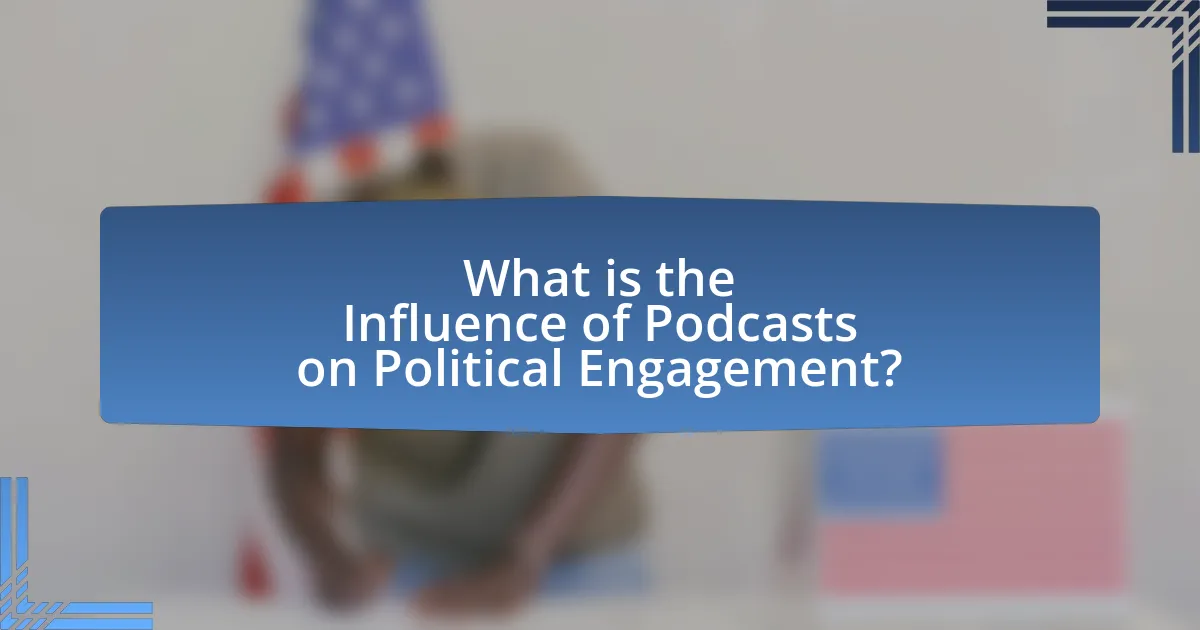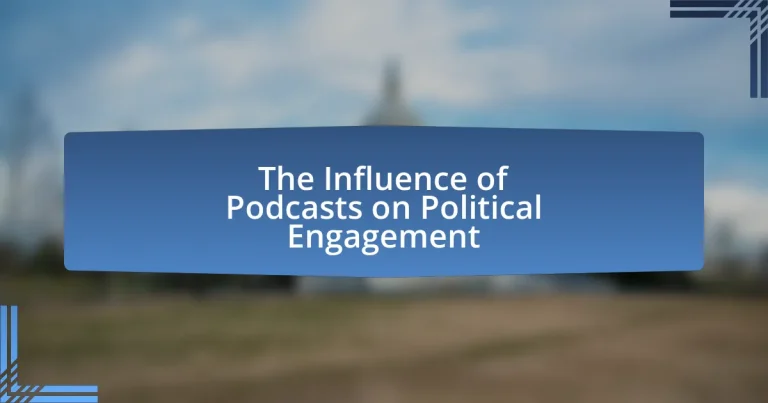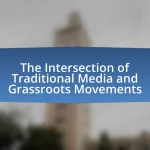Podcasts are emerging as a significant medium for enhancing political engagement by providing accessible platforms for discussion and information dissemination. Research indicates that podcast listeners demonstrate higher levels of political knowledge and civic participation, including voting and attending town hall meetings. The article explores how podcasts shape political discourse, inform listeners about political issues, and facilitate discussions among diverse viewpoints, while also addressing demographic trends in listenership and the potential impacts on voter behavior. Additionally, it examines the challenges podcasts face, such as misinformation and barriers for marginalized voices, and offers strategies for individuals to leverage podcasts for enhanced political engagement.

What is the Influence of Podcasts on Political Engagement?
Podcasts significantly enhance political engagement by providing accessible platforms for discussion and information dissemination. Research indicates that individuals who listen to political podcasts are more likely to participate in civic activities, such as voting and attending town hall meetings. A study published in the Journal of Communication found that podcast listeners reported higher levels of political knowledge and engagement compared to non-listeners, demonstrating that the format effectively informs and mobilizes audiences. Additionally, podcasts often feature diverse perspectives, fostering a more informed electorate and encouraging critical thinking about political issues.
How do podcasts shape political discourse?
Podcasts shape political discourse by providing a platform for diverse voices and perspectives, facilitating deeper engagement with political issues. They allow listeners to access in-depth discussions and analyses that traditional media often overlook, thereby influencing public opinion and political awareness. For instance, a study by the Pew Research Center found that 32% of Americans have listened to a podcast, with many citing political content as a primary interest, indicating that podcasts can significantly impact how individuals understand and engage with political topics.
What role do podcasts play in informing listeners about political issues?
Podcasts serve as a significant medium for informing listeners about political issues by providing accessible, in-depth discussions and diverse perspectives. They allow audiences to engage with complex topics in a conversational format, often featuring expert interviews and analysis that traditional media may not offer. Research indicates that 51% of podcast listeners report that podcasts help them understand political issues better, highlighting their effectiveness in enhancing political knowledge. Additionally, podcasts can reach niche audiences, fostering communities around specific political interests and encouraging civic engagement.
How do podcasts facilitate discussions among diverse political viewpoints?
Podcasts facilitate discussions among diverse political viewpoints by providing a platform for varied voices and perspectives to be shared and heard. This medium allows hosts and guests from different political backgrounds to engage in dialogue, often leading to nuanced conversations that challenge prevailing narratives. For instance, a study by the Pew Research Center found that 64% of podcast listeners appreciate hearing opinions that differ from their own, indicating a strong interest in diverse viewpoints. Additionally, podcasts often encourage listener interaction through social media, further broadening the scope of discussion and engagement with multiple perspectives.
Why are podcasts becoming a popular medium for political engagement?
Podcasts are becoming a popular medium for political engagement because they offer accessible, in-depth discussions that resonate with diverse audiences. This format allows listeners to consume content at their convenience, fostering a deeper understanding of political issues. According to a 2021 report by Edison Research, 41% of Americans aged 12 and older have listened to a podcast in the past month, indicating a significant reach. Additionally, podcasts often feature expert interviews and personal narratives, which can enhance relatability and trust in the information presented, further driving political engagement.
What demographic trends are evident in podcast listenership?
Podcast listenership shows significant demographic trends, particularly among age, gender, and education levels. Research indicates that younger audiences, specifically those aged 18-34, represent the largest segment of podcast listeners, with 49% of this age group reporting they listen to podcasts monthly, according to the Edison Research “Infinite Dial 2023” report. Gender trends reveal that men are slightly more likely to listen to podcasts than women, with 54% of male respondents indicating regular listenership compared to 46% of female respondents. Additionally, higher education levels correlate with increased podcast consumption; individuals with a college degree are 30% more likely to listen to podcasts than those without. These trends highlight the evolving landscape of podcast audiences and their potential influence on political engagement.
How do the accessibility and convenience of podcasts contribute to their popularity?
Podcasts are popular due to their high accessibility and convenience, allowing listeners to consume content anytime and anywhere. This format caters to busy lifestyles, as individuals can listen while commuting, exercising, or performing household tasks. According to Edison Research, as of 2023, over 80 million Americans listen to podcasts monthly, highlighting their widespread appeal. The ability to access a vast array of topics on-demand further enhances their attractiveness, enabling users to tailor their listening experience to personal interests and preferences.
What are the potential impacts of podcasts on voter behavior?
Podcasts can significantly influence voter behavior by shaping political opinions and increasing political engagement. Research indicates that podcasts provide accessible platforms for political discourse, allowing listeners to consume information at their convenience, which can lead to heightened awareness of political issues. For instance, a study by the Pew Research Center found that 32% of Americans reported listening to podcasts, with a notable portion engaging with political content, suggesting that this medium can effectively reach and inform potential voters. Additionally, podcasts often feature diverse perspectives, which can challenge listeners’ pre-existing beliefs and encourage them to explore different viewpoints, ultimately impacting their voting decisions.
How do podcasts influence political knowledge and awareness among listeners?
Podcasts significantly enhance political knowledge and awareness among listeners by providing accessible, in-depth discussions on current events and political issues. Research indicates that podcast listeners often report increased understanding of political topics due to the format’s ability to present complex information in an engaging manner. For instance, a study by the Pew Research Center found that 49% of podcast listeners feel more informed about political issues compared to non-listeners. This increase in awareness is attributed to the diverse perspectives and expert interviews featured in many political podcasts, which help listeners critically engage with the material and form their own opinions.
What evidence exists linking podcast consumption to increased voter turnout?
Research indicates that podcast consumption is positively correlated with increased voter turnout. A study conducted by the Pew Research Center found that individuals who regularly listen to political podcasts are more likely to engage in civic activities, including voting. Specifically, the study revealed that 29% of podcast listeners reported being more informed about political issues, which directly influences their likelihood to participate in elections. Additionally, a survey by Edison Research showed that 40% of podcast listeners aged 18-34 expressed a higher intention to vote compared to non-listeners, highlighting the medium’s role in mobilizing younger voters. These findings collectively support the assertion that podcast consumption can enhance political engagement and voter turnout.
How do podcasts compare to traditional media in political engagement?
Podcasts enhance political engagement more effectively than traditional media by fostering deeper connections and facilitating niche discussions. Research indicates that podcast listeners are more likely to engage with political content, as they often seek out specific topics that resonate with their interests, leading to increased knowledge and participation in political discourse. A study by the Pew Research Center found that 49% of podcast listeners reported being more informed about political issues compared to 36% of traditional media consumers. This suggests that the personalized nature of podcasts allows for a more engaged audience, ultimately influencing political behavior and awareness.
What advantages do podcasts offer over television and radio for political discussions?
Podcasts offer several advantages over television and radio for political discussions, primarily due to their accessibility, depth of content, and audience engagement. Unlike television and radio, which often have time constraints and limited formats, podcasts allow for longer, in-depth conversations that can explore complex political issues thoroughly. This format enables hosts and guests to discuss topics without the interruptions typical of traditional media, fostering a more nuanced understanding of political matters.
Additionally, podcasts are accessible on-demand, allowing listeners to engage with content at their convenience, which is supported by the fact that as of 2023, over 80 million Americans listen to podcasts monthly, indicating a growing preference for this medium. Furthermore, podcasts often cultivate niche audiences, enabling discussions that resonate more deeply with specific listener interests compared to the broader, more generalized content found in television and radio. This targeted approach enhances listener engagement and fosters a community around political discourse.
How do podcasts address the limitations of print media in political engagement?
Podcasts address the limitations of print media in political engagement by providing a more accessible and dynamic platform for discussion and information dissemination. Unlike print media, which often requires literacy and can be limited by geographical distribution, podcasts can reach a broader audience through audio content that is easily consumable on various devices. This format allows for real-time updates and discussions, fostering a sense of immediacy and relevance in political discourse. Additionally, research indicates that 55% of podcast listeners feel more informed about current events compared to traditional media consumers, highlighting the effectiveness of podcasts in enhancing political awareness and engagement.
What challenges do podcasts face in influencing political engagement?
Podcasts face several challenges in influencing political engagement, primarily including audience reach, misinformation, and listener bias. The limited reach of podcasts can hinder their ability to engage a broader audience, as many potential listeners may not be aware of specific podcasts or may not prioritize them over traditional media. Misinformation is another significant challenge, as podcasts can inadvertently spread false narratives, which can mislead listeners and undermine trust in political discourse. Additionally, listener bias affects engagement; individuals often choose podcasts that align with their pre-existing beliefs, creating echo chambers that limit exposure to diverse perspectives. These challenges collectively impede the potential of podcasts to foster meaningful political engagement among a wider audience.
How does misinformation in podcasts affect political perceptions?
Misinformation in podcasts significantly distorts political perceptions by shaping listeners’ beliefs and attitudes based on inaccurate information. Research indicates that individuals exposed to misleading content are more likely to adopt polarized views, as they often lack the critical skills to discern factual from false information. A study published in the journal “Political Communication” found that misinformation can lead to increased political polarization, as listeners may reinforce their existing biases rather than challenge them. This effect is compounded by the intimate and persuasive nature of podcasts, which can create a false sense of credibility and trust in the information presented.
What barriers exist for marginalized voices in the podcasting space?
Marginalized voices in the podcasting space face several barriers, including limited access to resources, lack of representation in mainstream media, and systemic biases. Limited access to resources, such as funding and technology, restricts the ability of individuals from marginalized communities to produce and distribute their content effectively. According to a 2021 report by the Pew Research Center, only 22% of Black and Hispanic adults reported having access to the necessary technology for podcasting compared to 40% of White adults. Additionally, the lack of representation in mainstream media creates an environment where the narratives of marginalized groups are often overlooked or misrepresented, further perpetuating stereotypes. Systemic biases within the podcasting industry can lead to gatekeeping practices that favor established voices over new, diverse perspectives, making it challenging for marginalized creators to gain visibility and audience engagement.
How can individuals leverage podcasts for enhanced political engagement?
Individuals can leverage podcasts for enhanced political engagement by actively listening to diverse political content, which provides insights into various viewpoints and issues. Engaging with podcasts allows individuals to stay informed about current events, understand different political ideologies, and participate in discussions that shape public opinion. According to a 2021 report by Edison Research, 41% of podcast listeners are more likely to engage in political discussions after listening to political podcasts, highlighting their role in fostering informed dialogue. Additionally, individuals can share podcast episodes on social media platforms, amplifying important political messages and encouraging others to engage in political discourse.
What strategies can listeners use to critically evaluate political podcasts?
Listeners can critically evaluate political podcasts by employing several strategies. First, they should assess the credibility of the host and guests, considering their backgrounds, expertise, and potential biases. Research indicates that hosts with relevant experience or academic credentials tend to provide more reliable information. Second, listeners should analyze the sources cited within the podcast, verifying claims against reputable news outlets or academic studies to ensure accuracy. A study by the Pew Research Center highlights that fact-checking claims can significantly enhance understanding of political discourse. Third, engaging with diverse perspectives by listening to a range of podcasts can help listeners identify biases and develop a more nuanced view of political issues. Lastly, reflecting on personal biases and how they may influence interpretation of the content is crucial for objective evaluation.
How can individuals find podcasts that align with their political interests?
Individuals can find podcasts that align with their political interests by utilizing podcast directories and search engines that categorize shows by topics, including politics. Platforms like Apple Podcasts, Spotify, and Google Podcasts allow users to search for specific political themes or keywords, helping them discover relevant content. Additionally, social media platforms and online communities often share recommendations and reviews of political podcasts, providing insights into popular choices among listeners. Research indicates that 51% of podcast listeners are more likely to engage with political content that resonates with their views, highlighting the importance of targeted searches in finding suitable podcasts.


